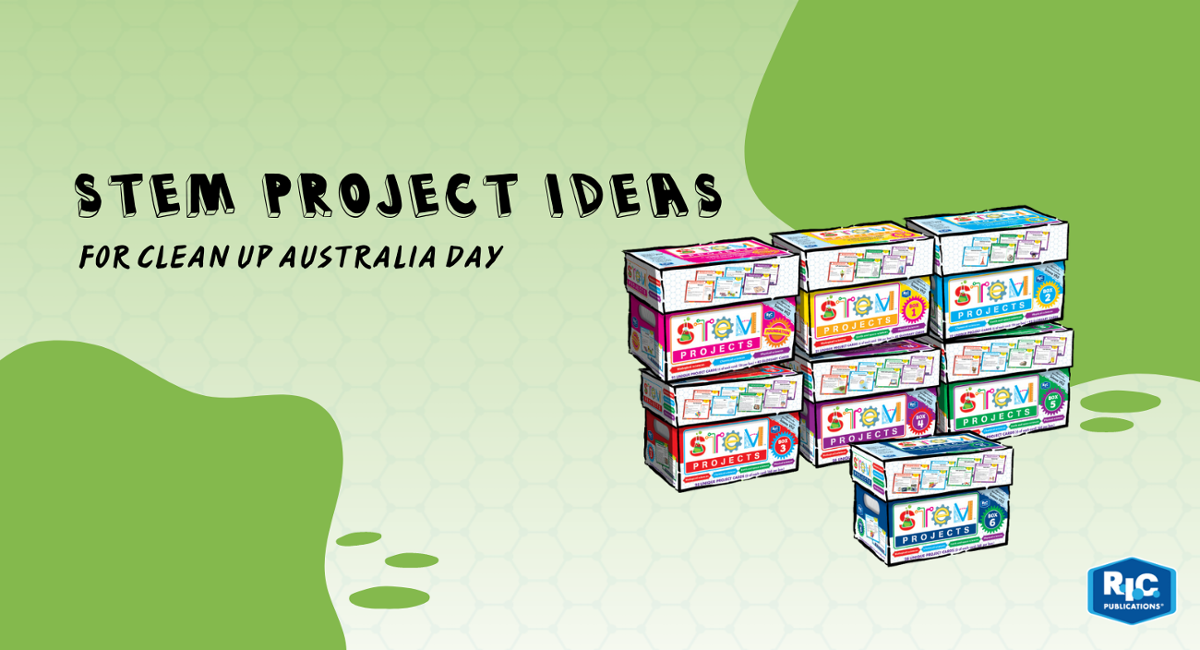- Tuesday 20 February 2024
- 0 Comments
Are you looking for a hands-on way to teach students about the impact of rubbish and pollution on their local environment?
From recycling, to water and air pollution, to habitat destruction and climate change effects, School Clean Up Australia Day is a great opportunity to explore different learning areas and connect real-life concepts back to Science!
If you’re planning to participate in School Clean Up Australia Day, then get prepared ahead of time with some STEM project activities to get your students thinking creatively about their impact on the environment, and what they can do to play an active role in their local community.
Check out these STEM project activity ideas:
Waste Data Collection and Analysis
Task students with collecting and analysing data related to the types of waste they collect during the cleanup (e.g. recyclable materials, biodegradable materials, paper vs plastic vs glass, etc.)
Students can use this data to create charts, graphs and reports (promoting use of mathematical and analytical skills.)
Robot Trash Collectors
Task students with designing and building a simple robot using recyclable materials.
For bonus points, the robot should be designed with a feature that can aid students in waste collection cleanup (e.g. navigation system, object recognition, sorting mechanism, weight measurement system, compacting system, etc.)
Students engaging in this activity will be using their engineering and technology skills.
Biodiversity Studies
Combine clean-up efforts with a biodiversity study. For example:
- Head to a local park or hiking track to clean up the area and study the native flora and fauna.
- Visit a local beach with mangroves and study the role mangroves play in protecting coastlines and supporting biodiversity.
- Organise a beach excursion with the intention of collecting and sorting beach litter while learning about the impact of pollution on ocean ecosystems.
During the excursion, task students with creating a short documentary or presentation documenting their findings in these areas and the potential impacts littering can have on native flora and fauna.
3D Printed Eco-Friendly Tools
Integrate technology by tasking each group of students to design an eco-friendly tool or container using 3D modelling software. Have each group explain their reasoning for material choices and the purpose of each creation.
If you have access to a 3D printer, you can also print the designs and use them during the cleanup.
Solar-Powered Trash Compactors
Task students with designing and building a solar-powered trash compactor. This provides an opportunity to educate students about the benefits of solar power, while also encouraging them to use engineering and technology skills.
To assess the project, you can ask students to provide labelled technical drawings or diagrams of their creation, along with an engineering logbook throughout the duration of the project to document their design process, challenges faced, and solutions implemented.
Bring more STEM learning into your classroom with Revised STEM projects!
Integrating Science, Technology, Engineering and Mathematics, the Revised STEM projects series focuses on the knowledge and understanding of Australian Curriculum: Science.
And, with STEM becoming so essential to classroom teaching, we’re excited to announce that our newly revised STEM projects boxes are finally here for 2024 (and now incorporate the essential areas of learner diversity and assessment.)
Students can work collaboratively or individually to build transferable problem solving and innovative thinking skills for engagement with the everyday world, including Science knowledge and skills, Design and technology skills, Mathematics skills and general capabilities.
STEM Skills:
- Observation and inquiry
- Interdisciplinary learning
- Connection to real world problem solving
- Critical and creative thinking
- Teamwork and collaboration
